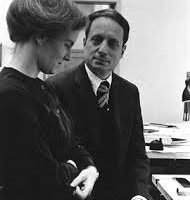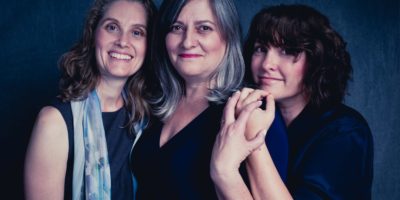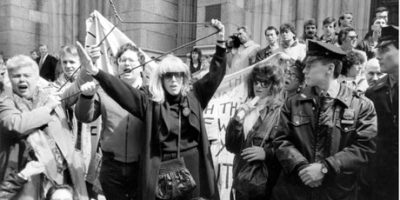Lilith Feature
Why L.A.? Why Women? And Why Now?
Brous explains that the davening experience at Ikar is designed to be powerful, personal and moving, even for cynics and atheists. The dynamic mix of frum Jews with the seriously marginalized creates a special energy. The common language is music — a blend of Ashkenazi, Sephardi, and Mizrahi, old and new, U2 and Debbie Friedman.
Paradoxically, while striving to make people “spiritually uncomfortable,” Brous and the team take special pains to make people feel welcome, with a cadre of “trained schmoozers” who stand outside every service greeting people.
Ikar is known for intense Shabbat davening as well as creative weekly house parties in homes and bars. The house parties started when Brous realized early on that people were more than willing to engage in Torah study and deep conversation about life’s great struggles and blessings, as long as they didn’t have to first overcome barriers to participation (institutional or their own assumptions).
When joining Ikar, people take on social justice commitments, from working to end hunger, to advocating for immigration reform, environmental justice, or participation with Ikar’s partner community in Uganda, where they are funding the use of Israeli technology in a village school.
Of Rabbi Brous’ leadership style, Melissa Balaban observed, “She once said to a rabbinic intern, ‘If people walk out of services talking about how smart the rabbi is, you’ve failed. They should leave saying, ‘I never knew Torah could be so relevant in my life’. Then you succeeded.” Balaban added, “I don’t think that’s a typically male approach.” She continued, “There is something about how women lead organizations, with our hearts and brains at the same time.”
Said Rabbi Brous, “We are constantly striving to engage a culture shift to a tzedakah model rather than a ‘pay to pray’ gym membership model.” Her own rabbinic interns are now fanning out across the country, bringing her “special sauce” of activism and challenge with them.
—–
“I believe we should lower the bar for coming in the door and raise the bar of what we’re offering.”
–Rabbi Susan Goldberg
After working for 10 years as a dancer and community organizer, Susan Goldberg began studying with the late Rabbi Carole Meyers, the first female rabbi of a Los Angeles synagogue, Temple Sinai of Glendale.
Goldberg was raised as one of the only Jewish kids in her Echo Park neighborhood, and still lives on the East Side, in Eagle Rock. While in rabbinical school at the Academy for Jewish Religion, California,a transdenominational rabbinical, cantorial and chaplaincy school in Los Angeles, she was invited to stop by her local synagogue, Temple Beth Israel of Highland Park. TBI had dwindled to a handful of mostly elderly folks who continued showing up on Shabbat morning even after the temple’s last rabbi died in the mid-1970s. A couple of members in their 30s and 40s were trying to revive the congregation, and reached out to Goldberg to attend. “Then they found out I was a rabbinical student,” she said, “so I started leading a once-a-month family service. That was the engine for growth. It was like being in a small town. I’d be in the park or meeting people and tell them about synagogue. People started coming, one family at a time. We added an adult learning program. Another person started a school with 10 kids. After a couple of years I became education director. Last year we had 75 kids in school and a couple hundred families. A lot of people never thought they’d be members of a synagogue.”
The majority of members are interfaith families, including several gay and lesbian families. “A lot of what happens with interfaith couples is that the non-Jewish partner is leading the journey (towards integrating Judaism into their homes), but they feel alienated. My feeling is, let’s be inviting, not exclusive.”
“It’s not about having no boundaries,” Goldberg noted. “I encourage people to be clear about what traditions in the house are Jewish, not to look for something diluted. I believe we should lower the bar for coming in the door and raise the bar of what we’re offering, so that it’s deep and rich, layered and complex.“
Goldberg approaches learning with a psycho-spiritual focus, pairing text study with concepts that apply to daily life. Take, for example, a Talmudic discussion of lost and found objects, focusing on yeush, a state of despair when someone gives up hope of recovering something they have lost. She might start a learning session by looking directly at the text and then translating from Hebrew and Aramaic so people can have the experience of text study. Then she’ll ask how this concept applies to other things in our lives that we feel we have lost: connections, relationships, places inside ourselves that we want to recover, taking a generative concept from one setting and exploring it in ways that are emotionally and spiritually relevant today.
After seeing her astonishing success at TBI, the huge Wilshire Boulevard Temple — built by L.A. movie moguls in the 1920s — has recruited Rabbi Goldberg to work some of her magic under its massive, newly-renovated dome.
—–
“The end point of prayer is not ‘I feel better about myself’, but ‘I’m now charged to act’.”
–Rabbi Naomi Levy
Also on this year’s Daily Beast Top Rabbis list, Rabbi Naomi Levy was in the first class to ordain women at the Conservative movement’s Jewish Theological Seminary. She served seven years as rabbi of Mishkon Tephilo, a traditional Conservative synagogue in Venice, California. “I loved being a congregational rabbi. But it never failed that on Shabbat, being near the beach, people would stroll in and have a look around. I knew they were Jews, but could almost count how long they would stay — seconds,” said Levy. “Our services there were created and led by Jewish insiders, which is wonderful, and at the same time, I found myself drawn to the Jewish outsiders. It’s interesting, since I grew up in Boro Park, attended the Yeshiva of Flatbush, and went to Orthodox summer camp. I didn’t know a single non-Jew; I didn’t even know there was a Halloween. I was really living in an alternate environment.” And yet, Levy had known that she wanted to be a rabbi since she was four. Perhaps she is drawn to outsiders because “I wasn’t exactly in the environment that would welcome my dreams,” she noted, adding that she was lucky to have come of age just at the time when women were permitted to become Conservative rabbis. “For me to have been at that moment in history at that time in my life, it was like coming home.”




